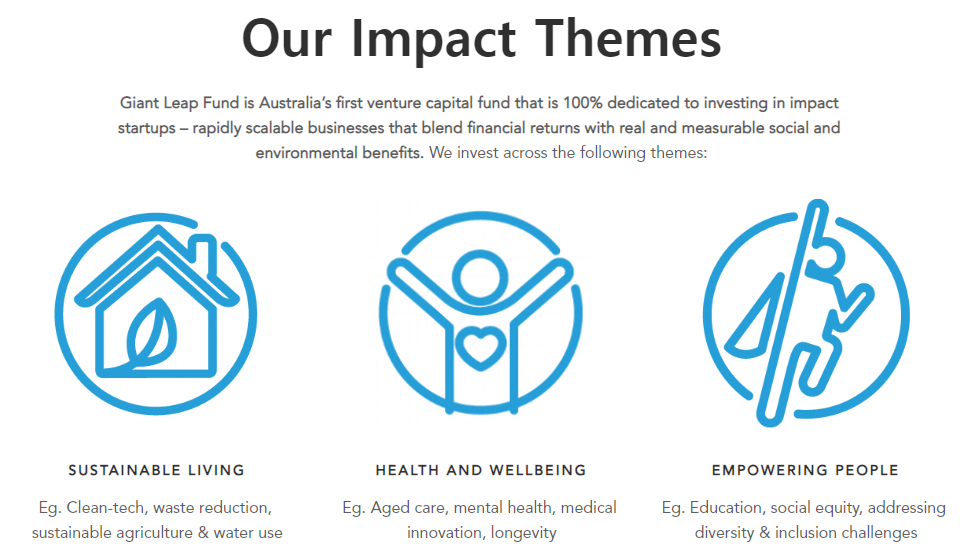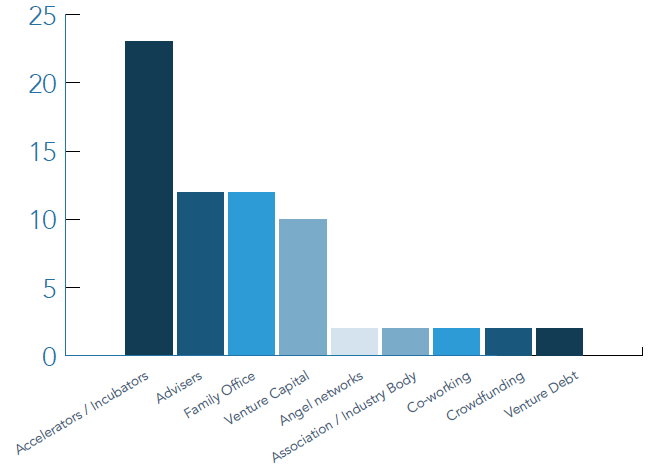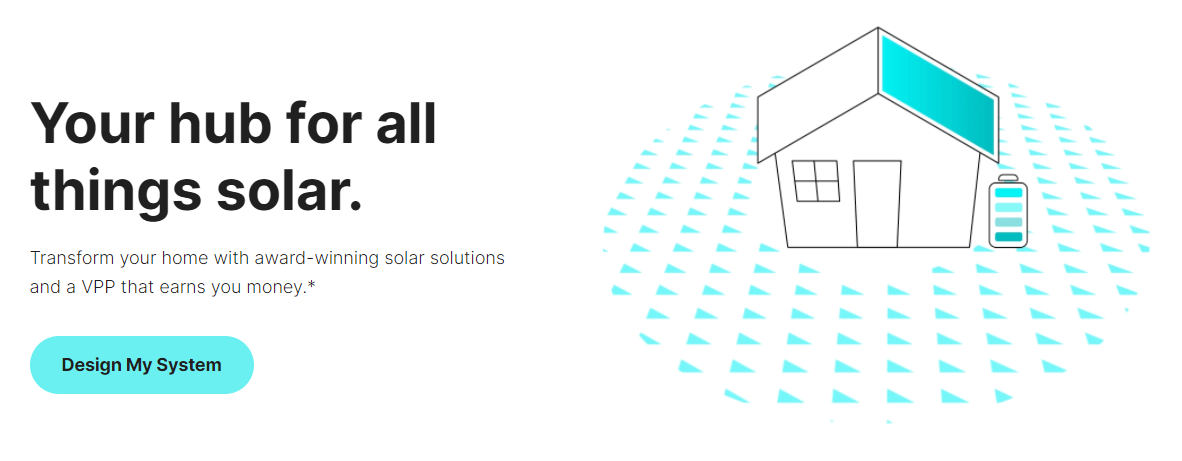– Increasing impact investment that has a positive impact on society and the environment –
– Promising of impact startups in the fields of sustainability, health and well-being, and competency-enhancing education –
As the impact on society and the environment becomes more important, consumers' demand for ethical products increases, employees want to do socially meaningful work, and more and more investors seek profits through investments in good companies. Following this trend, impact investing and impact startups are entering the main market from a niche in Australia. Impact investing refers to investments in companies, organizations, and funds that have a positive impact on society or the environment along with financial returns. .
The Australian startup ecosystem has grown significantly over the past 10 years, and the impact startup ecosystem is also continuing to expand. According to Giant Leap, Australia's first and only impact startup venture capital firm, 2015% of local startups raised between 2020 and 20 are classified as impact businesses. Over the past five years, the proportion of investment in impact startups among the total startup investment has increased by about 5 times from 15% to 23%. A survey by Pause Fest found that 1.5% of startups in Australia's technology sector said they were considering quantifying their social or environmental impact, and 75% of startups said they were motivated by making a difference. In response, the number of impact startups is expected to steadily increase.
Australia Impact Startup Ecosystem
Giant Leap divides impact startups into three main themes: sustainable living, health and wellbeing, and empowering people. 3 saw an increase in startups in the environmental and healthcare sectors, including energy supply chains, circular economy, and telehealth. In addition, more than 2020% of the 19 impact startups invested by Giant Leap so far are female startups, which is higher than the female participation rate of general startups, and it can be seen that gender diversification is taking place within the team.
3 themes of impact startups in Australia

In the global impact VC investment market led by the US and Europe, sustainable agriculture, renewable energy, and public health are in the spotlight. In the case of Asia and Oceania, 29% of the total VC market is accounted for, but impact investment is still low at 8%. In a 2020 RIAA (Responsible Investment Association Australasia) survey, 63% of Australians said they would like to receive investment advice that takes into account social or environmental impacts, suggesting that impact investing in the country will continue to increase.
According to data released by the Thomson Reuters Foundation, Australia is the second most favorable environment for social entrepreneurship in the world after Canada. As an important part of the ecosystem of impact startups, accelerators, angel clubs, venture funds, advisors, and related organizations that directly support the startup can be cited. Currently, more than 70 companies in Australia are contributing to the growth of Impact Startups through funding, mentoring and networking support for Impact Founders. Recently, an impact startup-focused accelerator program has been newly launched in the Starmate and Melbourne Accelerator Programs, and it is expected that impact investment and growth opportunities for impact startups will increase in the future.
Number of institutions supporting impact startups in Australia

Melbourne-based HR tech startup Culture Amp is Australia's first B-Corp certified unicorn, valued at A$2021 billion in 20. B-Corp is a certification system that measures the positive social and environmental performance that a company creates. Assess how a company's operations and business model affect its governance, its members, its communities, the environment, and its customers. Culture Amp is a platform that connects employees and is used by more than 4000 customers, including Airbnb, Oracle, and McDonald's. The success story of Australia's Culture Amp is also a good example for entrepreneurs and job seekers who are planning to establish an impact startup.
Promising areas for impact startups in Australia
1) Sustainable living
Currently, investors are showing great interest in sustainability to prevent the climate change crisis, a global hot topic. Sustainability is becoming an important part of startup founders, and in Australia, energy, waste (garbage) disposal, and food tech sectors are particularly popular among impact startups.
energy
Australia is a country with the world's largest rooftop solar installation rate, with 1000 million households with roof-type solar systems distributed among 270 million households. The basis for establishing the VPP, a virtual power plant required to supply electricity stably using the surplus power produced through solar panels, has been laid. Accordingly, startups such as ShineHub were established to realize the operation of virtual power plants, providing VPP services in SA, VIC, and NSW for the first time in Australia.
Australia's first virtual power plant startup

In addition, in order to reduce thermal power generation with high greenhouse gas emissions and convert it to 100% renewable energy, solar power generation or wind power batteries, which are heavily influenced by nature, will play an important role. The cost of batteries has fallen by about 10% over the past decade, paving the way for the development of the renewable energy industry and the growth of the sustainable electric vehicle market. Many start-ups are working to develop low-cost, installable home batteries, portable batteries, and more. In relation to this, the head of the hydrogen department of Clean Energy Finance Corporation (CEFC) mentioned that the demand for fuel cells using hydrogen technology and automobile parts to expand the supply of electric vehicles will increase in an interview with KOTRA Melbourne Trade Office. He replied that he was looking forward to entering the industry.
garbage disposal
Australia generates about 1 tonnes of garbage per person per year and 2.7 kg of garbage per person at home. Recently, in Australia, awareness of the problem of waste is increasing centered on the government, businesses, and local economy, and various methods are suggested to reduce it. In particular, landfills generate carbon dioxide equivalent to 1% of Australia's total greenhouse gas emissions from food waste. As a result, technology that uses insects or microorganisms to naturally dispose of waste or decompose it into fertilizer is being developed through startups.
food tech
In Australia, the proportion of greenhouse gases generated by the livestock industry is high at 10%, and the demand for plant-based protein that can replace meat with sustainable and healthy food is steadily increasing. Beyond Meat has been a huge success in the global market, and the number of foods producing meat substitutes is increasing in Australia as well, and there are start-ups that manufacture substitute meats made with mushrooms and cultured meats made in laboratories. In addition, indoor farms are attracting attention as a solution for the development of sustainable food production systems. Related technologies include an empty space indoors, a box for growing crops using the roof, and a system that can reduce water usage.
2) health and wellbeing
The COVID-19 pandemic is accelerating the digital transformation of the healthcare market. By connecting huge amounts of health data through wearable devices and applying technologies such as machine learning and artificial intelligence to healthcare services, more efficient results were obtained.
telehealth
According to Transparency Market Research, the global telehealth market is expected to grow to USD 13 billion by 2025 at a high growth rate of 230% annually. In particular, since the early days of the COVID-2020 pandemic in early 19, the active support of the Australian government has enabled the rapid application of new telehealth technologies to the medical industry. With these changes, the number of telehealth startups has rapidly increased, including a platform that provides 24-hour emergency care, an online tool that allows patients to receive medical attention when they submit symptoms to a doctor, and a platform that allows them to book and wait for a telehealth consultation. .
disease prevention
Interest in health services that detect and manage chronic diseases at an early stage by applying the latest technology is growing. According to the Australian Department of Health, around 50% of Australians can prevent the disease through proper management. Technologies such as wearable devices and artificial intelligence are making disease prevention services cheaper and more convenient than before. In the future, the demand for digital test kits that can check for genetic or chronic diseases at home through blood and saliva, and alarms that notify the date and time of hospital visits and medications are expected to increase.
worker well-being
According to a report by Shared Value Australia, workplace stress is a dreadful disease that causes long-term anxiety and depression, costing Australian companies A$130 billion in sick leave and medical expenses for their employees. Local companies hope to be able to collect data on the mental well-being of their employees and provide appropriate care and wellness solutions. In addition, the demand for a platform that manages and guides employees' mental health through the app is increasing. As a result, there will be more opportunities for startups that use software to provide solutions to improve employee well-being and mental health, such as Australian startup Pioneera, which has developed a platform to detect early signs of stress and prevent burnout. it is expected
Employee mental health and stress improvement platform

3) Empowering people
The global edtech market is growing at an annual rate of 12.2% and is expected to reach $2025 billion by 4040. As face-to-face classes became impossible during the COVID-19 pandemic, high-quality online education became even more important. As many jobs become digital due to technological advances, it is predicted that by 2030 more than 10 billion people will need reskilling education to learn new skills.
STEM (Science, Technology, Engineering, Maths)
It is expected that STEM ability will play a very important role in getting a job in the future. Local experts estimate that they will spend more than twice as much time as they do today on science, math, critical thinking, and problem-solving to get the job done. According to the Australian government's support policy, parents are also showing great interest in edutech platforms that can be done at home. Recently, in Australia, you can see STEM education startups that have applied creative methods such as subscription boxes for science experiment tools, software programming, and digital platforms for 2D printing.
education for the underprivileged
There is a growing demand for welfare services for the socially disadvantaged and the elderly in Australia. The government's support for the National Disability Insurance Scheme, the national disability insurance scheme, is also expanding, with the federal government budgeting A$2019 billion for 20/180 in addition to the A$2020 billion allocated in the 21/39 budget. Reinforcing their capabilities is morally and economically important, providing voice-controlled smart home devices for patients with mobility difficulties, sign language translation devices, and vibrating guidance for the visually impaired. Technology and education platforms that support people to live independently, such as phones that provide
Discovering talent and strengthening diversity
According to the McKinsey & Company report, when there is cultural and gender diversity at the senior executive level within the company, the profitability in the market is increased by 33% or more. In addition, many research results have been published that performance is improved when there is diversity in the business, but it has not been applied in the actual industry. In order to overcome this limitation, there is a trend of start-ups that provide guidance so that they can fairly recruit talent without prejudice and form a team with enhanced diversity. Work180, a start-up that provides employment support for women, is attracting attention in the industry. In addition, it is a blind recruitment platform, a special recruitment service that allows you to obtain information about candidates with a specific group of talent, and efficient communication and surveys about internal regulations. Concepts such as platforms that can be used are gaining popularity.
Startups that support women's career development and employment

implication
As an advanced country in the financial and investment field, Australia has an excellent ecosystem for startups to grow, and is a country with good conditions for entering the global market and attracting capital. Due to the strong containment policy in response to the COVID-19 pandemic, digital transformation is rapidly progressing, and all members of the government, individuals, businesses, industries, universities, and local communities are very interested in social and environmental issues. This trend is having a huge impact on investment and startups, and impact investment is expected to expand further in the future.
With Australia's developed startup ecosystem and government support measures, the barriers to entry are low and the demand from overseas VC investment companies is high, so Korean companies are required to strategically advance into the Australian market. Domestic startups will also be able to take an interest in the promising fields of impact startups, which are spotlighted locally, and try to advance into the Australian market, which is in the spotlight as a global test market, and attract investment.
Source: Giant Leap, IBIS World, RIAA, McKinsey & Company, KOTRA Melbourne Trade Office interview and data synthesis



